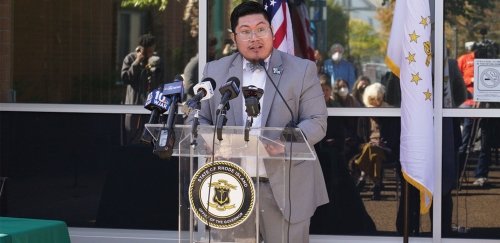In-State Tuition to Help Undocumented Students Accomplish Dreams
- News & Events
- News
- In-State Tuition to Help Undocumented Students Accomplish Dreams

“Rhode Island’s motto is ‘Hope,’ and implementing legislation like this gives optimism to many.” -Victor Morente '14
Last October, Governor McKee signed into law legislation that ensures in-state tuition at public colleges for Rhode Island students regardless of their immigration status. This applies to all three of the state’s institutions of higher education: CCRI, Rhode Island College and University of Rhode Island.

Karina Mascorro, the program coordinator for the Office for International, Immigrant, Undocumented, DACAmented, and Refugee Student Services at RIC, explains that Rhode Island is the 18th state in the U.S. that has allowed undocumented students to pay in-state tuition, which encourages them to stay here instead of moving to do graduate or undergraduate work in a different state that might provide the in-state benefit.
Preceding this new bill, RIC was already advocating for and accepting students who had lived in Rhode Island for three years and had completed their high school or GED in the state. Responding to student needs, her team provided information on how to apply for alternative financial aid, as undocumented students are not eligible for federal student aid.
“The need for someone to work with undocumented, DACA and refugee students was clear. We were getting a lot of cases of students that fell into those categories, so in 2019, my office’s mission got expanded to also include services for them,” says Mascorro.
In addition to now being eligible for in-state tuition, these students also qualify for the alternative FAFSA, the Rhode Island financial aid application for students that don’t qualify for federal aid. “In the case of students who are having dire financial challenges, we refer them to Learning for Life and the Emergency Student Fund [through the Rhode Island College Foundation], where they can access other resources,” adds Mascorro.
Victor Morente ’14, was one of those students who could have benefited from this bill. He was brought to Providence from Guatemala when he was just six years old. From a very young age he dreamed about someday going to college.
“By fourteen, I had a serious conversation with my mom about my future as an undocumented student,” he recalls. “My mother asked me if I wanted to continue to go to school here, or go back to Guatemala, a country I barely remembered. That day changed my life.”
Soon after, Morente had a meeting with his guidance counselor at his high school. “The counselor told me that no matter what I did, how hard I worked, how great my grades were or how many academic achievements or awards I received, because of my status, I was limited. I wouldn’t qualify for in-state tuition or federal financial aid,” he explains. “She said I should look at technical schools or a job that doesn’t require a college degree. That took my drive away. I went from being a strong student to a much more laid back one, because I didn’t know what my future held. The door to a college education was essentially shut on me.”
Despite that setback, he was committed to working hard and demonstrating that with perseverance his dream of having a bachelor degree would come true. After graduating from high school, he started at CCRI as a part-time student with his mom helping to pay out-of-state tuition, which was more than double the in-state tuition rate.
Little did he know that good things were coming his way. At age 22, Morente received a call from his attorney saying that he got a court date and that his petition to gain legal permanent residency would be considered. He was granted his Permanent Resident Card soon after and with his immigration status secured, he transferred to RIC to continue his education. By 2014, he completed a degree — with honors — in political science and public administration.
Morente’s own experience made him want to advocate to help other students like him. While still a student, he met State Representative Grace Diaz (D-District 11), and learned about her work on the in-state tuition legislation. “The bill is what really got me into political science, activism and advocacy. I wanted to have a say, to have a voice,” says Morente.
At first, he was hesitant to open up about his immigration status. “Being undocumented you don’t always want to share your story, you’re very nervous about what that could result in,” he says. “But I realized that my story is not unique in any sense, and that there is another kid out there waiting for that one opportunity, even if it is just the difference between paying $3,000 or $1,000 to be in school. How fair would it be for me to keep my mouth shut and be afraid, when that person is looking for that one chance and I can help them make their way up?”
Mascorro says that the new bill sends a message, loud and clear, that RIC is a college where everyone, regardless of status, is welcome. “We’re supporting RIC students and advocating for them at every level, by listening to their concerns, including them, teaching them how to advocate for their right to be here, and validating their experiences,” she adds.
Morente, who became a U.S. citizen in 2017 and now serves as the Communications Director for the Rhode Island Department of Education, advises students dealing with the same obstacles he had a decade ago to keep going. “Rhode Island’s motto is ‘Hope,’” he notes. “Implementing legislation like this gives optimism to many, it helps them stay on that path moving forward.”
